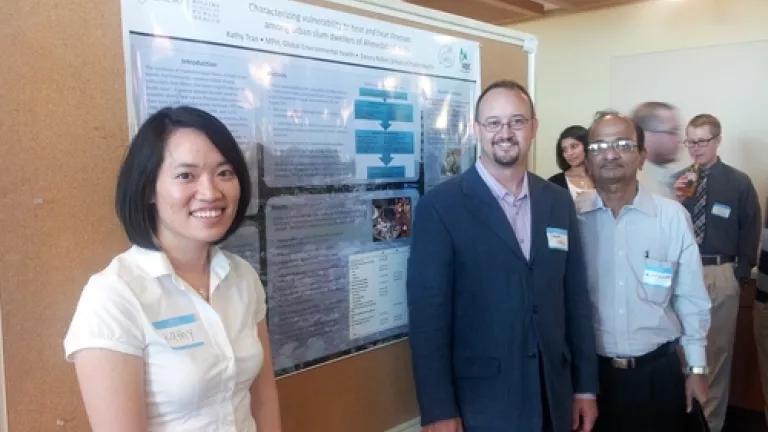Kathy Tran Guest Blog: Ahmedabad to Atlanta - Partnership Advances Innovative Project to Protect Communities Against Extreme Heat in India

Guest Blog by Kathy Tran, Master of Public Health, Global Environmental Health, Emory University Rollins School of Public Health
Our innovative heat adaptation project in Ahmedabad, the largest city in the Indian state of Gujarat, gained important momentum last week. Dr. SP Kulkarni, the Chief Medical Officer of Ahmedabad Municipal Corporation (AMC), met with Dr. Jeremy Hess and Kathy Tran at Emory University’s Rollins School of Public Health while traveling to Atlanta, Georgia to discuss the latest developments in our collaborative project. This gathering of partners offered a unique opportunity to strengthen Ahmedabad’s support of our joint activities to develop strategies to build local resilience to extreme heat in India.
Kathy Tran, Dr. Hess, and Dr. Kulkarni at Emory University, May 2012
(Photo credit: Emory University)
Temperatures already spike to 46.8°C (more than 116°F) in Ahmedabad and heat waves are predicted to become more frequent and intense due to climate change. As a part of this adaptation effort, together with NRDC, Emory, and our partners at the Indian Institute of Public Health, Gandhinagar (IIPH) and Mount Sinai School of Medicine, we are working to develop a unique “heat health early warning system” to build local resilience to rising temperatures.
At this meeting with Dr. Kulkarni, Kathy Tran and Dr. Hess discussed the findings of her on-the-ground study held last summer in Ahmedabad, characterizing the vulnerability of urban slum populations to extreme heat. The study focused on factors that affect heat exposure, susceptibility to heat-related illness, and adaptive capacity, all of which contribute to heat vulnerability. She and Dr. Hess also relayed targeted recommendations that the city can adopt now to prevent heat-related illnesses and deaths within slum communities during this summer’s heat waves. This project will also add to the limited literature on the health impacts of heat in India and highlight future directions for Indian public health officials and researchers to undertake interventions and research.
As Ahmedabad gears up for more potentially record-setting hot weather, our project is moving forward on several fronts (please follow links below for more details):
- Ahmedabad is currently planning to install several new weather gauges in the city – a first step in accurately recording temperatures throughout the growing city so AMC can issue targeted warnings of increasing temperatures to the public.
- In March 2012, NRDC, IIPH and Mount Sinai held a workshop in Ahmedabad focused on the local health care sector’s capacity to treat and prevent heat-related illnesses among Ahmedabad’s poorest residents.
- We also released our newest joint report and factsheet on protecting local communities from extreme heat, detailing critical actions that the municipal and health care sectors can take in the short- and long-term.
- A local hospital, Shardaben Municipal General Hospital, which serves some of Ahmedabad’s poorest residents, is replacing its black tar roof with a cool, white china-mosaic tile roof and moving the maternity ward from the hot top floor to the cooler bottom floor of the building to reduce the impacts of heat on its patients.
- We continue to build our partnerships and increase our international cooperation between scientific and environmental communities, with the strong support of Ahmedabad’s municipal government.
All of these exciting steps forward will continue momentum to develop and implement an innovative heat health early warning system, the first-of-its-kind in India. With temperatures already hovering at 42.2°C (108°F) this week, we will press forward to reduce the devastating health effects of heat stress in India.
(Co-authored by Meredith Connolly, NRDC Energy Law & Policy Fellow)
